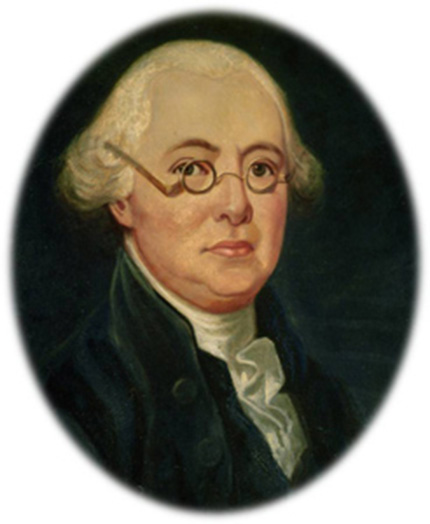
We thank our friends at RealClearPolitics for their report of our work at the James Wilson Institute. In particular, we are grateful for the writing of our friend Mike Sabo. This article on the James Wilson Institute explains the project of recapturing the wisdom of the Founding Generation and their application of Natural Law as they created a republican society. Our mission of restoring the first principles of our law gave rise to this publication, which is designed as a beacon for the Natural Law discourse and its continued relevance in American jurisprudence.
Should the U.S. Constitution be interpreted through the lens of the Declaration of Independence? A recent debate hosted by The Federalist Society pitting teacher and writer Hadley Arkes against University of Toledo law professor Lee Strang demonstrated that this is not merely an academic question. It touches on the foundations of the American regime – the “Novus ordo seclorum” (new order of the ages) conceived during the summer of 1776.
“As the culture becomes more and more deeply entrenched in relativism,” Arkes argues, “we need to recapture the wisdom of the founding generation, which can be found in the luminous writings of our beloved Alexander Hamilton, Chief Justice John Marshall, and our own James Wilson.”
Arkes founded the James Wilson Institute to “restore to a new generation of lawyers, judges, and citizens the understanding of the American Founders about the first principles of our law and the moral grounds of their own rights.” The Institute emphasizes the mutual dependence of natural rights and natural law – the rights that all people hold by nature and our corresponding duties and moral obligations.
Now celebrating its eighth anniversary, the Institute recently moved to Old Town, Alexandria, a historic Virginia neighborhood on the banks of the Potomac River.
The Institute’s namesake is an important but often forgotten Founder who signed both the Declaration of Independence and the Constitution and served as a justice on the first Supreme Court. Wilson gave a series of lectures on jurisprudence at the University of Pennsylvania that drew Arkes’s interest. He outlined, Arkes notes, a penetrating “account of the American law and the American Founding that take us to the philosophic and moral roots of jurisprudence.”
Wilson’s approach to law, which the Founding generation largely shared, was rooted in natural law. Arkes has described natural law as the claim that moral principles of justice exist apart from the written law and are accessible to anyone through the use of reason. He points out that early American statesmen, including Hamilton and Marshall, regularly traced their judgments back to what Hamilton called in “Federalist 31” the “first principles, upon which all subsequent reasonings must depend.”
These “necessary truths” would have existed even if the Bill of Rights had never been adopted, Hamilton noted in the penultimate essay of “The Federalist.” As Arkes recently wrote in a 1776 Series essay at RealClear’s American Civics portal, “John Quincy Adams would argue that the ‘right to petition the government’ was simply implicit in the logic of a free government: it would be there even it hadn’t been set down in the First Amendment.”
The Institute teaches the moral foundations of the law with its James Wilson Fellowship, an annual weeklong seminar for young appellate lawyers and law students. The program boasts 119 alumni, including multiple Supreme Court clerks, law professors, and even a state Solicitor General. For accomplished federal judges and gifted teachers of philosophy and law, the James Wilson Senior Seminar is a biannual conference that explores natural law jurisprudence at a deeper level.
Anchoring Truths, the Institute’s newest project, aims to recover the “grounding axioms” of the Constitution through essays, podcasts, videos, and more. The Anchoring Truths website gives lawyers and professors a place “to offer their own arguments, to make the case – and test again – the case to be made anew for the natural law of the American Founding.”
In a recent essay at Anchoring Truths, Arkes demonstrated how natural law informs the practical art of judging as he critiqued the Supreme Court’s decision in Fulton v. Philadelphia. In a unanimous ruling, the Court found that the city of Philadelphia abridged Catholic Social Services’ freedom of speech when it severed its contract because CSS would not place foster children with same-sex couples. Relieved that the Court sided with CSS, Arkes nevertheless expressed concern that the opinion dodged the crux of the case: the moral rightness or wrongness of making judgments about the nature of marriage.
“When lawyers begin to supply the reasoning that grapples with the substantive issues in the important cases that befall the courts,” Arkes wrote, “then the judges will have the arguments needed to make the proper decisions – ones rooted in those grounding axioms of law and the moral order that comprise that American regime.”
The Institute reports that coming initiatives include its fall Senior Seminar, which will feature high-level discussions on natural law, jurisprudence, and the American regime. It will also resume taking its work on the road, hosting a series of regional seminars for students at top law schools around the country.
The James Wilson Institute continues to teach a generation of lawyers, judges, and scholars ideas that were once widely known and need to be understood again.
This article was originally published at RealClearWire here.


